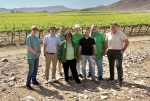Netumbo Nandi-Ndaitwah, who is the first female president-elect of Namibia, joins a league of notable but sparse presidential campaigns across the world, from developed to developing economies, that centred on economic diplomacy, emphasising international partnerships, trade, and economic reforms to drive development.
Nandi-Ndaitwah focused her campaign typically on job creation and economic development. A look at the economic components of her campaign manifesto will provide the lens through which her economic ideology, or Netumbonomics, could be examined. She pledged to invest N$85 billion to create 550,000 jobs over the next half-decade, targeting sectors such as agriculture, construction, and oil and gas. This initiative aims to reduce the youth unemployment rate, which is estimated to be over 50%.
As a means to achieving her job creation goal, her strategy involves leveraging Namibia’s natural resources to attract foreign direct investment (FDI) while ensuring that such investments align with national interests. By promoting value addition in sectors like mining and agriculture, she seeks to enhance local production and export capacity, thereby stimulating economic growth and job creation.
Beyond job creation, there are other indications that Nandi-Ndaitwah’s presidential victory may be attributed to her emphasis on economic diplomacy, which obviously resonated with the electorate.
Collins Nweke, a Fellow of the International Association of Research Scholars and Administrators, where he also serves on its Governing Council, says there are four additional reasons to consider as constituting the backbone of Netumbonomics, which powered her victory.
Firstly, her commitment to economic diplomacy aimed at attracting foreign investment to stimulate economic growth. By fostering international partnerships, she is seeking to enhance sectors like mining, tourism, and agriculture, thereby diversifying the economy and creating employment opportunities.
Secondly, she made a point out of addressing economic inequality. Namibia is classified as an upper-middle-income country by the World Bank but remains highly unequal, with 43% of the population living in multidimensional poverty as of 2021. Nandi-Ndaitwah emphasised the need for land reform and a fairer distribution of wealth. She drew from examples from elsewhere in Africa and global best practices in women’s empowerment, giving insights to a strategy that will invite, through diplomacy, women with economic power around the world to inspire, motivate, and invest in Namibian women. Her appeal to voters seeking economic justice appears to have resonated well.
Thirdly, recent offshore oil and gas discoveries have the potential to significantly boost Namibia’s economy. Nandi-Ndaitwah’s focus on economic diplomacy included plans to utilise resources like oil and gas to double the country’s GDP growth to 8% within a decade, promising improved livelihoods for Namibians.
Finally, as a seasoned politician with extensive experience in government, including a stint as Minister of International Relations and Cooperation, Nandi-Ndaitwah’s economic diplomacy platform offered continuity and stability. Her leadership was perceived as a means to maintain peace and stability while implementing necessary economic reforms, which appealed to voters desiring a steady hand during transformative times.
While Namibia’s election of its first female president is a historical milestone, it is her decision to anchor her campaign on economic diplomacy that appears to be a game changer for the continent. Her victory represents a significant step toward gender equality in African leadership. It could be argued that what delivered her victory was more of her policy shifts and economic transformation agenda than the focus on economic diplomacy. Before comparing her strategy with those of contemporary political leaders across the world, it may be instructive to assert that her commitment to “radical shifts” in addressing poverty and unemployment suggests potential departures from previous policies. She focused on equitable wealth distribution and land reform. By prioritising economic diplomacy, she also aims to transform Namibia’s economy from one reliant on raw material exports to a more diversified and industrialised economy, enhancing resilience and sustainability.
There seems to be a thread that runs through a set of themes for political leaders that have anchored their campaign strategies on economic diplomacy, which may offer some clue on where Netumbo Nandi-Ndaitwah is coming from. The themes across the campaigns have typically included global integration, infrastructure and industry, natural resource endowments, and regional leadership.
Candidates often emphasise strengthening their country’s position in global trade. Many, if not all, of the examined campaigns promote FDI for large-scale development projects. The resource-endowed nations amongst them have used economic diplomacy to attract ethical and sustainable investments while aiming to position their economies as regional economic hubs. Despite some variables, the campaigns generally show how economic diplomacy can be a powerful narrative, especially in countries seeking economic transformation and greater global influence.
President-elect Netumbo Nandi-Ndaitwah’s victory and her focus on job creation, mainly through economic diplomacy, hold the promise of significant positive changes for Namibia, provided that her administration can effectively implement the proposed strategies. Implementing her ambitious plans will require overcoming challenges such as securing the necessary funding, ensuring effective governance, and addressing potential resistance to reforms. Additionally, fostering a conducive environment for FDI while safeguarding national interests will be crucial.










